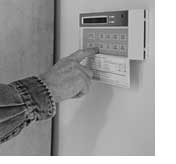Eichler Radiant Heating
 Don't mess with it. Yes, it's almost that simple when it comes to maintaining your radiant-heat system. Let's pose a few commonly asked questions and get some professional diagnoses.
Don't mess with it. Yes, it's almost that simple when it comes to maintaining your radiant-heat system. Let's pose a few commonly asked questions and get some professional diagnoses.
How often do you need to flush your radiant system? "Never flush it if you've got good pressure," advises Larry Wagner of Anderson Radiant Heating on the Peninsula. But periodically monitor the boiler operating pressure; it should be between 10 to 20 lbs. It's best to find out the optimum pressure setting for your particular system. And if it gets low, call a professional; there's a problem somewhere.
Radiant systems, assuming they are not leaking, are closed systems. When your system was new and first filled with water, oxidation on the interior surface of the tubing rapidly used up the oxygen in the water, and oxidation stopped. Wagner has seen cases where a copper system developed a leak after decades of trouble-free service, but when the water was flushed before the repair, it was almost crystal clear.
With modern techniques, leaks in copper pipes are readily repairable. If the tubing in your system is steel, and it was not properly installed or maintained, the first leaks may signal the end of the system's useful life. Once corrosion in a steel system starts, it can spread to such a degree that repair is not a practical option. (See "Radiant Afterlife" in the Fall 2000 Eichler Network for info on replacement systems suitable for Eichlers.)
Should the circulating pump make much noise while it's running? Bill Shockley of Redwing Energy in the East Bay answers this way: "Newer pumps are pretty quiet, as they are factory-sealed. Older pumps can make noise, and that doesn't necessarily indicate there is a problem." Still, excessive noise can mean it's time for a new pump. Parts that are likely to fail are the pump, pressure relief valve, the reducing valve; and the expansion tank can rust out, says Shockley. All of these items can be replaced.
So what can you do to keep your radiant system in tip-top shape? If the answer sounds simple, that's because it is. Franz Rogmans of Bay Area-wide Rogmans Hydronic Heating advises homeowners to keep the area around the boiler free and clean. "Nothing flammable, that's the main thing," he says. Have a qualified professional, someone experienced with Eichler radiant systems, give it a thorough inspection every one to three years. That should include a pressure test to check for leaks.
"Remember, most radiant leaks in the slab are not apparent by looking at your floor," explains Jerry Rothfeld of Rothfeld Hydronic Heating, serving Marin. "The water usually goes straight down into the ground." That means that some owners may have no idea that their system is leaking, since it is designed to automatically add water to keep up the pressure. When there is a leak, the system is no longer closed, and the oxygen in the fresh water will contribute to pipe corrosion, a prime source of future problems.
Properly maintained, with regular inspections, your Eichler radiant heat can last for decades. To be honest, it will probably be keeping your house warm far longer than you will be in it!




